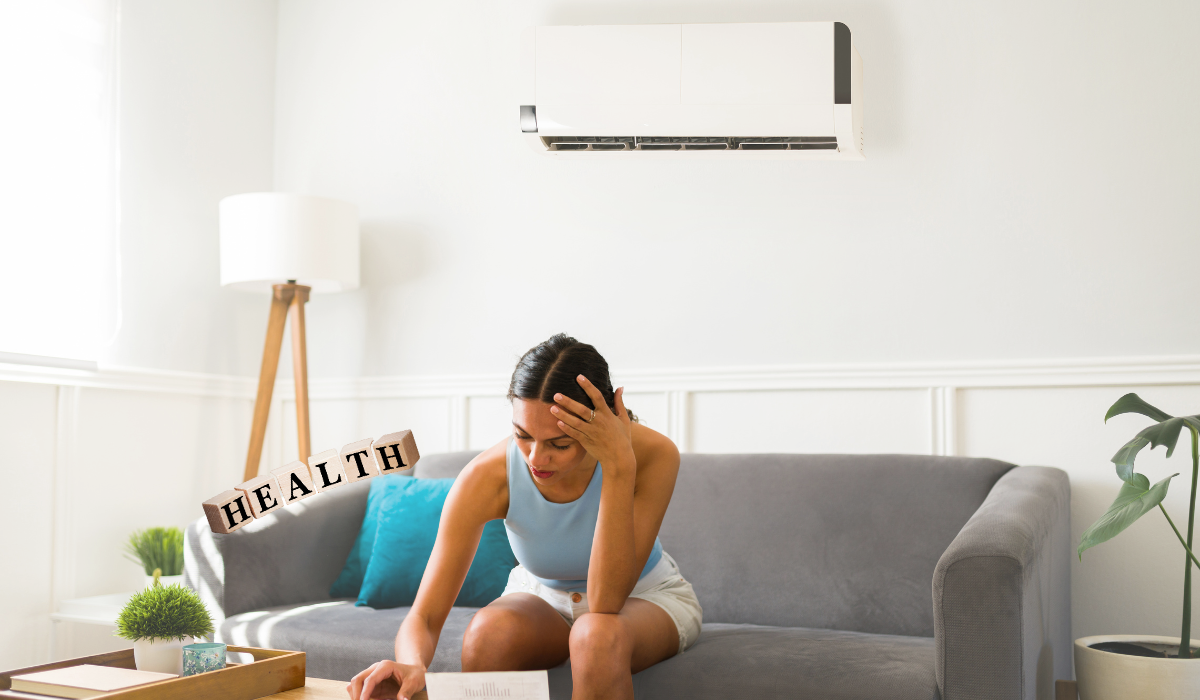With temperatures on the rise, air conditioners (ACs) have become essential in many homes and workplaces. While they offer a much-needed respite from the heat, spending too much time in air-conditioned environments can have several negative effects on your health. Here are five ways the AC effect on health might be impacting your well-being and some tips to mitigate these effects.
How AC Effects On Health
Dry Skin and Eyes
Air conditioners remove moisture from the air to cool it down. Prolonged exposure to this dry air can lead to dry, itchy, and irritated skin. It can also exacerbate existing skin conditions, like eczema. Similarly, the lack of humidity can cause your eyes to become dry and irritated, leading to discomfort and redness.
Muscle Stiffness and Joint Pain
The cold air from air conditioners can make muscles and joints stiff, particularly for individuals who are sensitive to temperature changes. Spending long hours in a cold environment can reduce blood flow to these areas, increasing stiffness and discomfort. This is especially problematic for people with conditions like arthritis, as it can worsen their symptoms.
Respiratory Issues
Air conditioners can trap dust, allergens, and other particles, circulating them throughout the indoor space. This can trigger respiratory issues, especially for those with asthma or allergies. Additionally, ACs can contribute to the spread of respiratory infections, particularly in crowded or poorly ventilated areas.
Increased Risk of Infections
If air conditioning systems are not properly maintained, they can harbor microbial contaminants like mold and bacteria. Breathing in these contaminants can increase the risk of infections and other illnesses, particularly in enclosed spaces with poor ventilation.
Headaches and Fatigue
Extended exposure to cold air can cause blood vessels to constrict, reducing blood flow to the brain and leading to headaches. The artificial cooling can also disrupt the body’s natural temperature regulation, making you feel tired and sluggish.
Tips to Stay Healthy While Using Air Conditioning
Maintain Optimal Temperature and Humidity Levels
Set your AC to a moderate temperature that is comfortable but not excessively cold. Aim for a humidity level that prevents the air from becoming too dry. Using a humidifier can help add moisture back into the air, alleviating dryness of the skin and eyes.
Ensure Proper Ventilation
Ventilate your indoor spaces regularly to allow fresh air to circulate. Open windows and doors when weather conditions permit, and use exhaust fans in areas prone to moisture buildup, such as bathrooms and kitchens. This helps reduce the concentration of indoor pollutants.
Regularly Clean and Maintain Your Air Conditioner
Schedule routine maintenance for your AC system. This includes cleaning or replacing filters, inspecting ductwork, and cleaning coils. Regular maintenance helps prevent the buildup of dust, debris, and microbial contaminants, ensuring better indoor air quality.
Take Breaks From Air-Conditioned Environments
Whenever possible, take breaks from air-conditioned spaces to allow your body to adjust to natural temperatures. Spend time outdoors or in naturally ventilated areas to benefit from fresh air and sunlight, which can improve your overall well-being.
Stay Hydrated
Drink plenty of water to stay hydrated, especially when spending extended periods in air-conditioned environments where the air is dry. Proper hydration helps maintain healthy skin, mucous membranes, and overall bodily functions.
By being mindful of how much time you spend in air-conditioned environments and taking these preventive measures, you can enjoy the comfort of your AC while maintaining good health.
Also Read: 3 Yoga Exercises To Increase Intelligence And Mental Agility
Conclusion
While air conditioning provides essential relief from rising temperatures, it can have several adverse effects on your health if used excessively. By understanding the AC effects on health and implementing simple preventive measures, you can enjoy the comfort of your AC without compromising your well-being. Regular maintenance, proper ventilation, and mindful habits can help you stay healthy and comfortable in air-conditioned environments.
FAQs
How can I prevent dry skin while using air conditioning?
To prevent dry skin, use a humidifier to add moisture back into the air, and apply moisturizer regularly. Also, ensure your AC is set to a moderate temperature to avoid excessive dryness.
Can air conditioning make respiratory conditions worse?
Yes, air conditioning can exacerbate respiratory conditions by circulating dust, allergens, and other particles. Regular maintenance of your AC system, including cleaning filters and ensuring proper ventilation, can help reduce this risk.
What is the ideal temperature to set my air conditioner to avoid health issues?
The ideal temperature is typically between 72°F and 78°F (22°C to 26°C). This range is comfortable for most people and helps prevent the air from becoming too cold and dry.
How often should I clean or replace my AC filters?
AC filters should be cleaned or replaced every 1-3 months, depending on usage and the manufacturer’s recommendations. Regular maintenance helps ensure better air quality and system efficiency.
Can spending too much time in AC cause headaches?
Yes, prolonged exposure to cold air from an AC can cause blood vessels to constrict, leading to reduced blood flow to the brain and resulting in headaches. Taking breaks and ensuring moderate indoor temperatures can help mitigate this issue.








